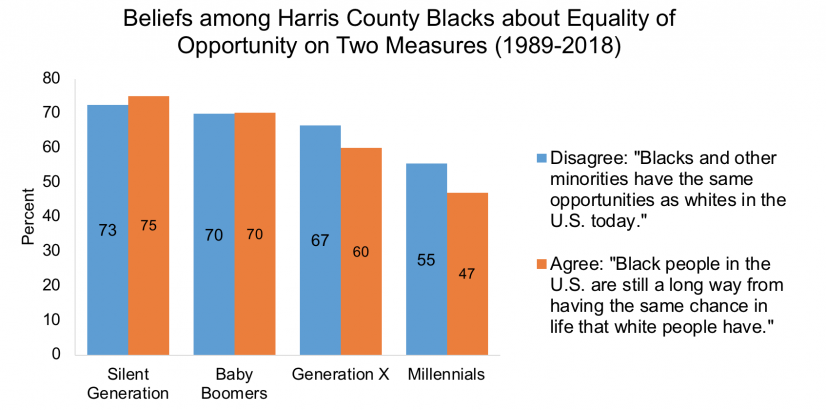From equality to advocacy: How generational challenges shape Baby Boomers and Gen Z
From Baby Boomers to Generation Z, each group has faced its own generational problem. The generational issue for Baby Boomers and older generations was racism against African-Americans according to a study done by Kinder Institute for Urban Research. Generation Z has discovered what their generational issue will be, activism. Generation Z’s overarching issues consist of gun control, climate change, abortion rights, gay rights and more, making Generation Z true activists in the eye of society.
Individuals within Generation Z have found their generational issues to be activism related because of the type of society that they were raised in. This causes Generation Z to want to fight for their rights as they come of age since society is facing so many different problems. In a survey by Irregular Labs that took “…nationally representative samples of 300 girl and GSM [gender and sexual minority] Gen Zs in each country,” researchers discovered that “75% of respondents said being politically or socially engaged is very important to their identity. Sixty-three percent said they primarily informed themselves about social and political issues through social media channels.”
From the result of these statistics, the percentages give insight as to how Generation Z has developed into a generation that will fight for what they believe in. Granted, Baby Boomers fought for equality towards the major concern of their generation, racism, but in today’s day and age, Generation Z is fighting for all sorts of activism opportunities. Part of the reason that Generation Z is less focused on racism is because of the fact that it has become less tolerable generation by generation. Those in Generation Z have seen diversity within public environments, such as school, more common than older generations. Baby Boomers would not have seen diversity within schools as common as it is today. Generation Z lives through a more diverse lifestyle with different ethnicities being seen as normal compared to out of the ordinary.
The pictured graph is provided by the Kinder Institute for Urban Research to give insight into how racism has become less of an issue through each generation. The discrimination towards African-Americans has slowly decreased generation by generation. African-Americans are beginning to find themselves as more equalized in today’s society than in past generations.
A pole asking 93 students at A-West if they have experienced or heard racism in the hallways of A-West gave insight into how racism is still a part of society today, but not as big of an issue. Fifty-five percent of students have not seen racism as common in the hallways of A-West whereas 45% see racism as common. With there being a larger number of students that have not seen or experienced racism as being common within A-West, it may reflect that racism has been slowly depleting throughout the years. Racism is still a part of Generation Z’s society, yet it does not appear to be as big of an issue as other various societal issues.
Generational issues seem to develop around the problems within society at the time. Older generations were dealing with issues of racism through the post-war era. African-Americans began to fight for their equality through protests and speeches. The most famous speech of this time was Martin Luther King Jr. ‘s speech of “I Have a Dream” in August of 1963. With MLK Jr. ‘s speech being so popular in the present day, it can only be assumed that it was even more impactful in 1963 when there was a large debate over equality for African-Americans within society. This speech gives an idea as to why Baby Boomers would be more focused on the generational issue of racism compared to any other issue at the time.
An article on Bustle addresses the recent developments of Generation Z. “Gen Zers who’ve already made waves in political circles offer a road map for their peers to get more involved in activism. Dolan-Sandrino and Sarah Chadwick, a co-founder of March For Our Lives, agree that social media defines their generation. They say Gen Z finds community, voices their opinion, and organizes protests particularly through Twitter and Instagram.”
Bustle provides insight into how Generation Z is taking on activism within society mainly pointing out how kids within this generation are pushing others in their age group to fight for what they believe. Ninety-five A-West students were also asked if they agreed that their generation focuses mainly on activism. In response, 80% of students said that Generation Z is the activism generation, whereas 20% said that Generation Z is not the activism generation. With the vast majority of students agreeing to their generation being focused on activism proves the idea that Generation Z has become more focused on advocating for themselves within society.
Baby Boomers will always have some sort of concern towards African-American equality because that was their generation’s issue. Generation Z may always have some need to indulge themselves in issues they feel have a need to advocate for. While the importance of the Baby Boomer generational issues integrate itself into future Generation Z generational problems, Generation Z’s issue is equal in importance to that of the previous generational issue. All generational problems follow one another but continue to change generation by generation, thus, impacting the current generation for the rest of their lives.

Amelie Bauer is a senior at A-West who enjoys running, mountain biking, and spending time with friends and family in her free time.



